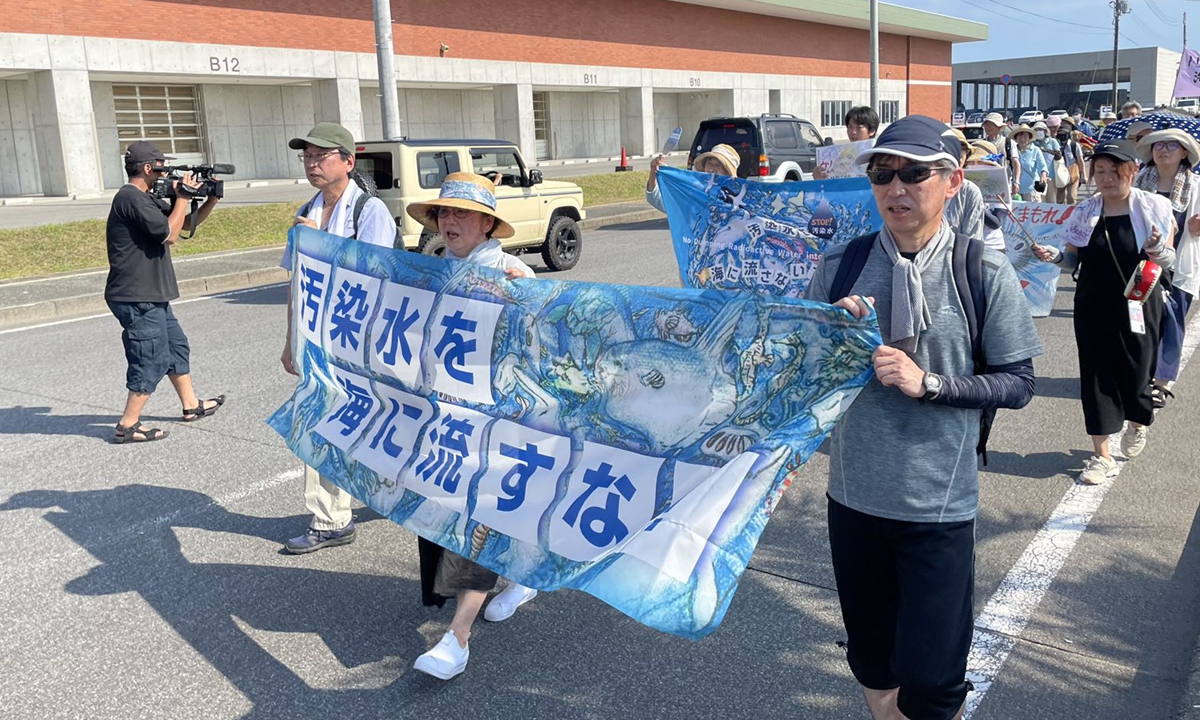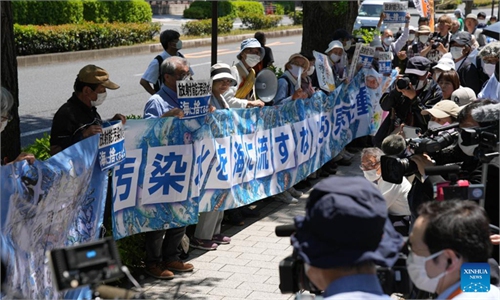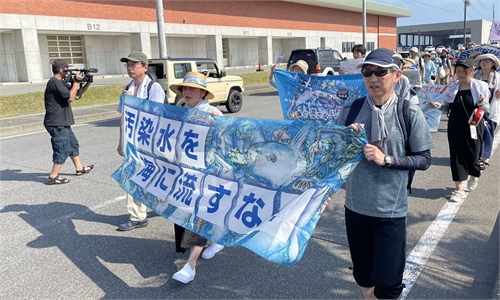FM says China's move 'based on facts and reason' as Japan complains of China tightening seafood imports due to nuclear-contaminated wastewater dumping plan

Holding banners that read "Don't dump the contaminated water into the sea," fishermen, fish immunology and genetic breeding experts and other local residents in Iwaki, Fukushima Prefecture take the street on July 17, 2023, to protest against Japanese government's plan to dump nuclear-contaminated wastewater into the ocean. Photo: Courtesy of Yoshitaka Ikarashi, a resident of Iwaki
The Chinese government puts people first, the Chinese Foreign Ministry said, noting that China's opposition to Japan's ocean discharge plan is based on facts and reason, after Japan recently complained that China had tightened radiation testing on its seafood imports, and some Japanese seafood had reportedly been "held up" at China's customs due to Tokyo's nuclear-contaminated wastewater dumping plan.
At a press briefing on Thursday, Chinese Foreign Ministry spokesperson Mao Ning urged Japan to "heed the call of the international community, stop pushing through the discharge plan, engage in full, sincere consultations with its neighbors, dispose of the nuclear-contaminated water in a responsible way and accept rigorous international oversight."
Japan's chief cabinet secretary Hirokazu Matsuno said on Wednesday that there have been cases of Japanese seafood exports "being held up by China," along with Japanese media reports saying that China has ramped up efforts to test "all seafood imports from Japan for radiation."
Earlier on July 7, China's customs announced a ban on imports of food from Japan's Fukushima and nine other regions, as Japan makes final preparations to dump nuclear-contaminated wastewater into the ocean.
Mao said Thursday that "Our job is to be responsible for the health of our people and the marine environment. Our opposition to Japan's ocean discharge plan is based on facts and reason, so are the measures that we have decided to take."
According to Japanese media outlet Asahi Shimbum, China is Japan's largest seafood destination, accounting for 87.1 billion yen ($624 million) in imports.
Many people from Japan and most of its neighboring countries, including China, are against Tokyo's irresponsible plan to dump the nuclear-contaminated water from the Fukushima plant into the Pacific Ocean.
A recent Japanese poll by Kyodo News showed 80.3 percent of respondents said they felt the explanation provided by the Japanese government on dumping nuclear-contaminated wastewater was insufficient.
More than 80 percent of respondents in 11 countries in the Asia-Pacific region except for Japan said Japan's plan to dump nuclear-contaminated water into the sea is "irresponsible," a survey conducted by the Global Times Research Center found recently.
A Gallup Korea survey from June shows that 78 percent of those polled said they were very or somewhat worried about contamination of seafood, according to a CNN report.
The obstruction of Japan's seafood exports is entirely self-inflicted, Lü Chao, the director of Institute of US and East Asian Studies under Liaoning University, told the Global Times on Thursday.
Trying to shift local fishermen's anger toward the Japanese government to neighboring countries exposed Tokyo as having no sense of decency and its ill intentions, Lü noted.
The Japanese government recently used various multilateral diplomatic occasions, including the NATO summit, to justify its plan, and gave signs that it will not postpone the hazardous dumping.
Mao criticized Tokyo's move as a global PR campaign. She said that the legitimacy and safety of Japan's nuclear-contaminated wastewater dumpling plan have been questioned by the international community, and no matter how much the Japanese side tries, it cannot whitewash the plan, and the protests of neighboring countries and the voices of doubt in Japan are clear evidence of this.
"If the Fukushima nuclear-contaminated water is truly safe, Japan wouldn't have to dump it into the sea—and certainly shouldn't if it's not," Mao said.
Dumping nuclear-contaminated wastewater into the ocean will seriously damage Japan's national image and its people's interests, Lü said, "More countries may take more stricter measures or even reject Japanese seafood imports in the future, as it's very obvious that radioactive elements can cause long-term damage to human."



